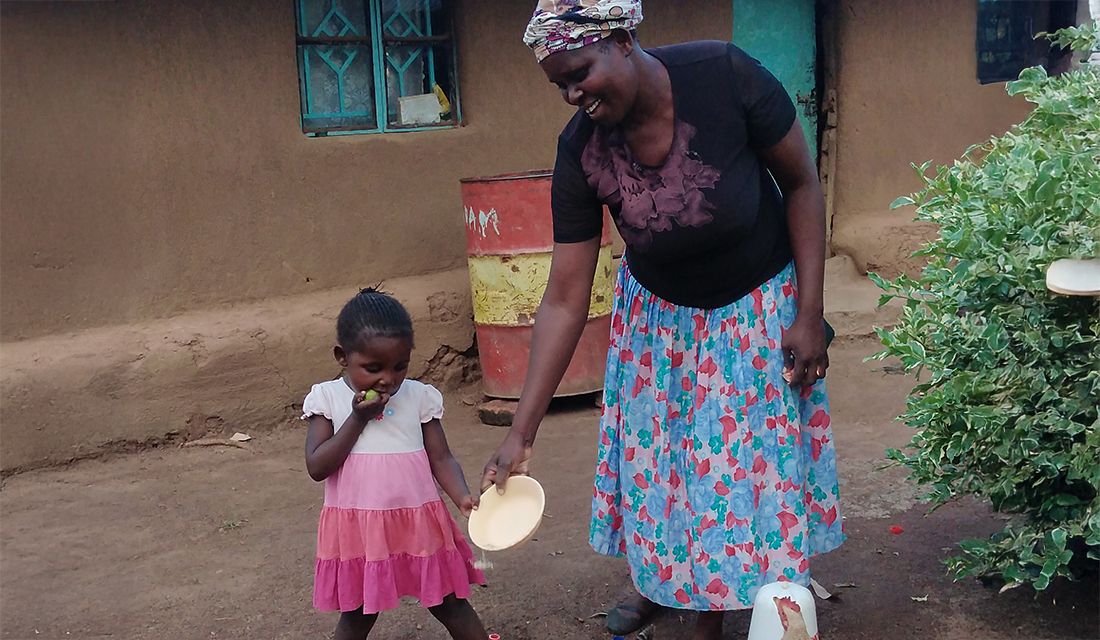Helping Families Flourish Through Moments That Matter®

“In early 2023, we met with our implementing partners to roll out new materials for use in Moments That Matter ® (MTM), our flashship early childhood development program partnership. It was an exciting and inspiring time which then translated into amazing progress for some of our program participants, parents and caregivers of children 0-3. The new materials included the introduction of new FAMA (Facts, Associations, Meanings, Action) cards with lessons focused on male caregiver engagement and positive discipline, and a new “Actions to Practice Passport,” a booklet for caregivers to record the progress they are making in practicing what they are learning about nurturing care.
While we were confident that some of these new tools and lessons would be very beneficial to child development, we were not anticipating the impact on mitigating family conflict and domestic violence. Also, connected to household harmony is the increasing economic empowerment of women through the kitchen gardens they are cultivating both for improving child nutrition, and for sale of the surplus produce.”
— Geraldine Sicola, Director, Early Childhood Development at Episcopal Relief & Development
“When I was introduced to the program, I underwent a shift in my perspective on parenting,” shared Caroline, a mother of three and Moments That Matter ® (MTM) program participant in Kenya.
Prior to participating in MTM, Caroline admits that she often thought that toys were meant to keep her kids busy while she did work around the house. She thought that play had no value in their development, and she didn’t involve them much in her own work either.
Through MTM, Caroline was introduced to a new way of thinking about caring for her children socially, emotionally and physically. She participated in Caregiver Support and Learning Groups (CSLG) about the kind of support children need to develop language, motor, thinking and social skills, and how to nurture their emotional intelligence throughout the first three years of their life. This included playing games, singing songs with them and providing nutritious meals.
Caroline was first introduced to MTM by an Early Childhood Development (ECD) promoter in her village. Through the community-led program partnership between Episcopal Relief & Development and ADS-Nyzanza, volunteers known as ECD promoters receive training that helps them engage with parents and other caregivers who are raising children. ECD promoters facilitate the monthly CSLGs during which a different topic of child care and nurturing is taught to the caregivers. The promoters then make monthly visits to each household and provide individualized attention and coaching to the caregivers related to the lessons in the CSLG sessions that help caregivers with responsive parenting. During these home visits promoters also make referrals to health and other social services when they see that the child or the pregnant mother needs special attention.
Caroline reflected, “I came to realize that children require nutrition, play and positive discipline to thrive and develop holistically.” She added, “The sessions I attended in the caregiver support and learning group challenged me to improve my child-rearing practices.”
In addition to gaining an understanding of what her children need, Caroline also has taken action to make sure her children have nutritious foods every day, in every season. Before MTM, Caroline’s children would often go without eating when her husband were unable to find work. As part of the program, caregivers have the opportunity to start gardens and create a steady flow of nutritious foods in their home. Caroline took advantage of that opportunity.
“We’ve become a satisfied, healthy and flourishing family.”
— Caroline
Today, Caroline and her children work together in their home kitchen garden, where they grow kale, pumpkin and tomatoes, and raise chickens. Caroline is able to sell the surplus vegetables and eggs for extra income for the household. Doing farmwork with her children has become her favorite activity because she is able to build her family’s economic resilience while fostering her children’s curiosity, teaching them values and skills through hands-on exploration.
Caroline is thankful for her participation in the MTM program, and shared, “We’ve become a satisfied, healthy and flourishing family.”


